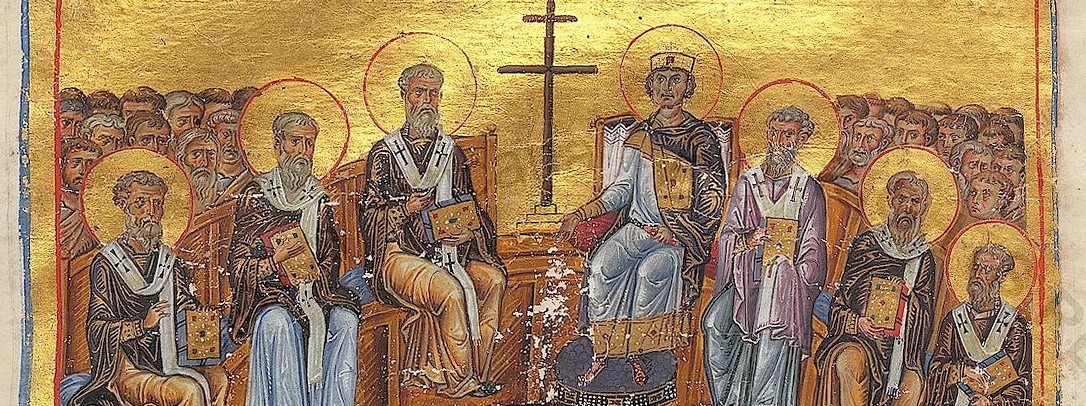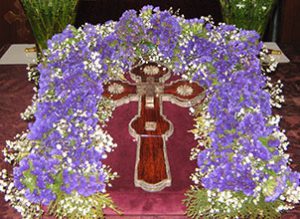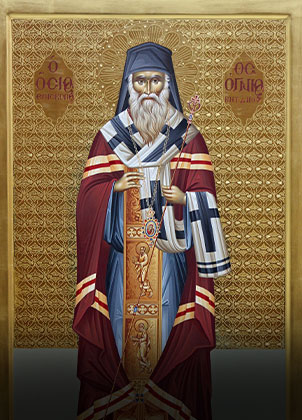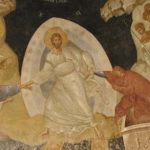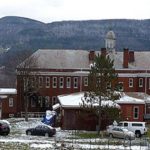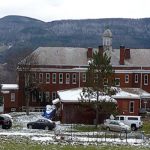Овцы не могут пасти самих себя. Проповедь
Во имя Отца и Сына и Св. Духа.
Братья и сестры,
Как в здоровом организме есть иммунитет – защитная реакция на всякую заразу, так и в Церкви, если появляется какая-нибудь ересь или неправда, то церковный организм реагирует и отвергает ее. Эту защитную функцию в Церкви исполняет церковный народ. Замечательно, что почти все ереси в истории Церкви были введены епископами и учеными богословами, а простой народ, миряне, распознали эти ереси и отвергли их. Народ Церкви есть хранитель благочестия.
Так случилось в 2007 г., когда произошло соединение с Московской Патриархией. Епископы соблазнились, а из мирян многие устояли. Буквально в каждом приходе сохранился остаток, который сохранил верность истинному церковному пути.
Также и сейчас вы оставили своего епископа, потому что увидели, что он не поступает как истинный пастырь .
Господь говорит в Евангелии, что «овцы за ним (своим пастырем) идут, потому что знают голос его. За чужим же не идут, но бегут от него, потому что не знают чужого голоса». (Иоан. 10, 4-5)
Таким образом, словесные овцы Христовы имеют дар от Бога распознать лже-пастыря и убежать от него. Но обойтись совсем без пастыря овцы не могут. Овцы не могут пасти самих себя, им необходимо требуется пастырь – священник.
Почему это так?
Нужно вспомнить, что Церковь – не человеческое учреждение, Церковь – это Тело Христово, богочеловеческий организм. Глава Церкви – Христос. Церковью управляют не люди, а Дух Святой, посредством тех, кого Он Сам избрал и поставил на это служение.
Св. Ап. Павел так говорил пресвитерам Ефесским: «Итак внимайте себе и всему стаду, в котором Дух Святый поставил вас блюстителями, пасти Церковь Господа и Бога, которую Он приобрел Себе Кровию Своею». (Деян. 20,28)
Управление Церковью невозможно для человека, это дело Божие. Даже самый гениальный человек, если он возмется управлять Церковью, то он только причинит вред Церкви.
Известно высказывание митр. Антония (Храповицкого): «Церковью управляет Дух Святой, а архиереи ему мешают».
Т.е. епископы, поставленные Духом Святым для управления Церковью, если они забывают, что они только орудия и начинают самоуправствовать, то они только мешают Духу Святому. Только те решения, которые согласны с волей Божией, войдут в жизнь Церкви. Если даже епископы всего мира соберутся и постановят что-либо неугодное Святому Духу, то это решение останется только на бумаге, Церковь отвергнет его.
В Церкви для прохождения того или другого служения преподается благодать через рукоположение. Если для чтецов и певцов имеется обряд руковозложения, то как может кто-либо управлять Церковью, не будучи призван и возведен на это служение благодатию Божией?
В Церкви всякое служение совершается по послушанию и благословению.
«Никто сам собою не приемлет чести, но призываемый Богом, как и Аарон» (Евр. 5, 4) – говорит св. ап. Павел.
Священник – такой же человек, как и все, и нередко в числе прихожан есть лица более образованные, талантливые и опытные. Но священник в таинстве рукоположения облекается благодатными дарами священнодействовать, учить и пасти стадо Божие.
Почему я говорю вам все это, братья и сестры?
Ваш приход пережил тяжелейшее, огненное испытание. По милости Божией, оно уже подходит к концу, и сейчас важно, чтобы после этого смутного периода установилась мирная, правильная, спасительная приходская жизнь. Она может быть построена только на незыблемом основании канонов Церкви. Овцы не могут пасти самих себя. Если священник реально не стоит во главе прихода, то приходская жизнь не может развиваться в правильном направлении.
Но и священник должен управлять людьми Божиими не как властитель, а как отец. Священник не должен быть самоуверенным, а должен советоваться с прихожанами о приходских делах.
Книга Деяний Апостольских рассказывает о первом апостольском соборе в Иерусалиме. Апостолы постановление своего собора начали словами «Угодно Святому Духу и нам…» (Деян. 15,28). Т.е. постановление их собора было не человеческим мнением, а законоположением Духа Святого.
Также и мы, начиная любое церковное собрание, поем молитву «Царю Небесный». Мы просим Бога Духа Святого, чтобы Он просветил наш ум, очистил наши сердца для того, чтобы не наша воля исполнилась, а через нас, недостойных, совершилась воля Божия. Но чтобы эта молитва была услышана, не должен ли на церковном собрании присутствовать тот, кто Святым Духом поставлен, чтобы быть вашим пастырем, т.е. священник?
Не хорошо мирянам собираться без священника для обсуждения церковных дел.
Конечно, Приходской Совет и без священника сможет отремонтировать зал или приготовить праздничный обед. Но подобные задачи не составляют цели существования прихода. Цель прихода в том, чтобы воспитать прихожан для будущей жизни. Чтобы войти в Царство Небесное, мы должны по мере наших сил уподобиться Христу, Который говорит: «Научитеся от Мене, яко кроток есмь и смирен сердцем». (Матф. 11,29)
Что же такое смирение? Смирение – это великое духовное богатство. Как белый свет составляется из всех цветов спектра, так и все духовные добродетели в совокупности называются одним словом «смирение». А верный, надежный путь к смирению – это послушание.
Закончу свое слово наставлением Св. Ап. Петра: «Пастырей ваших умоляю: … пасите Божие стадо, какое у вас, … и когда явится Пастыреначальник, вы получите неувядающий венец славы. Также и младшие, повинуйтесь пастырям; все же, подчиняясь друг другу, облекитесь смиренномудрием, потому что Бог гордым противится, а смиренным дает благодать.» (1 Петр. 5, 1-5)
Аминь.
Еп. Андрей
Sheep cannot shepherd themselves. Sermon
In the name of the Father, and of the Son and of the Holy Spirit.
Brothers and sisters,
Just as a healthy organism has an immune system – defensive reaction for every type of contagion; so it is with the Church – when some type of heresy or falsehood appears, the Church organism reacts and rejects it. This defensive function in the Church is executed by the people within the Church. It’s remarkable that in the history of the Church, nearly all the heresies have been introduced by bishops and learned theologians, while the common folk – laity, recognized and repudiated them.
People of the Church are the guardians of piety.
This is what happened in 2007 when the union with the Moscow Patriarchate took place. The bishops were enticed, while many laypeople stood firm. In every parish, there remained a remnant that preserved fidelity to the true Church path.
Likewise today, you have left your Bishop because you saw that he didn’t act as a true pastor.
The Lord speaks in the Gospel that “…the sheep follow him (their shepherd), for they know his voice. Yet they will by no means follow a stranger, but will flee from him, for they do not know the voice of strangers” (John 10:4-5).
Thus, Christ’s rational sheep have the gift from God to recognize the false shepherd and flee from him. However, the sheep cannot do without a pastor. They cannot shepherd themselves; it is imperative that they have a pastor – priest.
Why is that so?
It must be remembered that the Church is not a human institution. The Church is the body of Christ, a divine-human organism. The Head of the Church is Christ. The Church is governed by the Holy Spirit, through those men whom He selected and ordained to this ministry.
St Paul spoke thus to the presbyters of Ephesus: “Therefore take heed to yourselves and to all the flock, among which the Holy Spirit has made you overseers, to shepherd the church of God which He purchased with His own blood.” (Acts 20:28).
It’s impossible for man to govern the Church – it’s God’s work. Even if the most talented genius was to take upon himself to govern the Church, he would only inflict harm upon Her.
There is a well-known expression by Metropolitan Anthony (Khrapovitsky): “The Holy Spirit governs the Church while the bishops hinder Him.”
I.e. should the bishops, placed by the Holy Spirit to govern the Church, forget that they are only tools and begin to self-govern, they are then hindering the Holy Spirit. Only those decisions, which are in accord with God’s determination will come into the life of the Church. Even if the entire world’s bishops convened and decreed something that is unacceptable to the Holy Spirit, that decision will remain only on paper because the Church will reject it.
For the carrying out of one or another church ministry, there is the bestowing of grace through the laying of hands (ordination). If there is a rite of hand-laying for readers and singers, how can the Church be governed by somebody that has not been called and elevated for this service by God’s grace?
All the ministries in the Church are performed through obedience and blessing.
“And no man takes this honour to himself, but he who is called by God, just as Aaron was.” (Hebrews 5:4).
A priest is a person like everyone else, and quite often among the parishioners there are individuals more educated, talented and experienced. However, in the mystery of ordination, he is invested with grace-filled gifts to perform church services, teach and shepherd God’s flock.
But why am I telling you all this, brothers and sisters?
Your parish has lived through a most grievous, fiery trial. By God’s mercy, it’s coming to an end, and it’s now important that after all this turbulent period, a peaceful, right, salvific parish life be established. This can only be constructed on the immutable basis of the Church Canons. Sheep cannot shepherd themselves. If a priest doesn’t stand as the real head of the parish, then the parish life cannot develop towards the right direction.
Conversely, the priest should administer God’s people not as a ruler but like a father. The priest should not be self-confident, but has to consult with his parishioners on parish matters.
The Book of Acts of the Apostles relates about the first Apostolic Council in Jerusalem. The Apostolic Decree of their Council began with the words: “For it seemed good to the Holy Spirit, and to us…” (Acts 15:28) i.e. the Decree of their Council was not that of a human notion but a statute of the Holy Spirit.
Likewise, in beginning any church gathering, we sing the prayer “Heavenly King”. We entreat God the Holy Spirit to enlighten our minds, cleanse our hearts so that not our will be done, but through us unworthy servants, God’s will be done. However, for the prayer to be heard mustn’t there be a person present at the meeting, who has been appointed by the Holy Spirit to be your pastor, i.e. priest?
It’s not good for laity to gather to deliberate church affairs without a priest.
Of course, the Parish Council can – without the priest – renovate the hall, or organize lunch for a feast day. However, these and similar duties don’t constitute the aims of the parish’s existence. The aim of the parish is to prepare the parishioners for the future life. In order for us to enter the Heavenly Kingdom, we must become, as far as we can, imitators of Christ – Who says: “…learn from Me, for I am meek and humble in heart…” (Mat. 11:29).
What is this humility? Humility is a great spiritual richness. Just as the white light is composed of all the spectrum of colours, so are all the spiritual virtues called in a collective word – “humility”. And a true, reliable path toward humility – it is obedience.
I will finish my sermon with holy Apostle Peter’s exhortation: “The presbyters who are among you I exhort… shepherd the flock of God among you… and when the Chief Shepherd appears, you will receive the crown of glory that does not fade away. Likewise, you younger people, submit yourselves to the presbyters. Yes, all of you be submissive to one another, and be clothed with humility: for God resists the proud but gives grace to the humble.” (1 Peter 5:1-5).
Amen
Bishop Andrei

